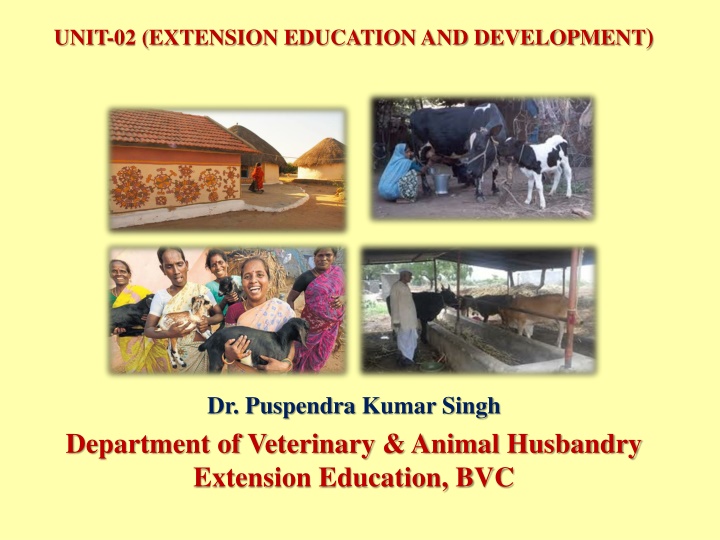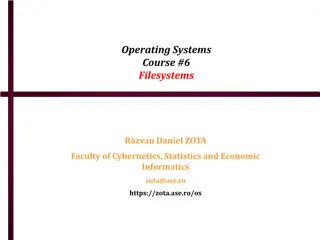
Extension Education and Development: Principles, Types, and Key Points
Explore the essence of extension education and development, covering topics such as formal, informal, and non-formal education, principles guiding extension education, key historical figures, and the significance of desirable changes in human behavior through education.
Uploaded on | 0 Views
Download Presentation

Please find below an Image/Link to download the presentation.
The content on the website is provided AS IS for your information and personal use only. It may not be sold, licensed, or shared on other websites without obtaining consent from the author. If you encounter any issues during the download, it is possible that the publisher has removed the file from their server.
You are allowed to download the files provided on this website for personal or commercial use, subject to the condition that they are used lawfully. All files are the property of their respective owners.
The content on the website is provided AS IS for your information and personal use only. It may not be sold, licensed, or shared on other websites without obtaining consent from the author.
E N D
Presentation Transcript
UNIT-02 (EXTENSION EDUCATION AND DEVELOPMENT) Dr. Puspendra Kumar Singh Department of Veterinary & Animal Husbandry Extension Education, BVC
Extension Education and Development 3rdYear, VAHEE
Topics covered Types non-formal education. Extension Education. of education: and Principles Formal, informal of
Some Key Points The term Extension Education was formally used 1st time in 1873 by Cambrige University. Father of Extension James Stuart Father of University Extension J P Leagan Father of Extension in India Dr. K N Singh SMART- Simple, Measurable, Attainable, Realistic, Time bound
Education Education: It is the production of desirable changes in knowledge (things known), attitude (things felt), and skills (things done), either in all (or) one or more of human behavior.
Meaning of EDUCATION Process of changes into the behavior of human Informal, Formal & Non-formal bringing desirable
Type of education Coombs & Ahmed (1974) drew a distinction between the three types of education as follows: Informal Education : The day to day process of learning, whereby knowledge is transferred in the context of the family, the neighborhood, the daily working relationships between the people and through experience. Formal Education: The education which takes place in the schools and colleges. It starts from theory to practice. It can either be general or vocational. Three is a fixed curriculum and set pattern of examination mostly leading to the award of degrees or diplomas. Non-formal Education : all organized education outside the formal education system. It is mostly practical and problem oriented.
Principles of extension education 1. Principles of Interests and needs 2. Grass roots principle 3. Principles of Cultural difference 4. Principle of indigenous knowledge 5. Principle of learning by doing 6. Principle of participation 7. Family principle 8. Principle of leadership 9. Principle of adaptability 10. Principle of evaluation 11. Principle of satisfaction
Principles of Extension Principles are generally guidelines, which form the basis for decision and action in a consistent way. The universal truths in extension, which have been observed and found to hold good under varying conditions and circumstances, are presented. I - Principles of interests and needs: People s interests and people s needs are the starting point of extension work. To identify the real needs and interest of the people are challenging tasks. The extension agents should not pass on their own need and interests as those of the people. Extension work shall be successful only when it is based on the interests and needs of the people as they see them. II - Grassroots principle: Extension programmes should start with local groups, local situations and local problems. It must fit to the local conditions. Extension work should start with the people where they are and what they have. III - Principle of cultural difference: Culture simply means social heritage. There is cultural difference between groups of farmers also. The differences may be in their habits, customs, values, attitudes and way of life. Extension work, to be successful, must be carried out in harmony with the culture of the people.
IV - Principle of indigenous knowledge: People have indigenous knowledge systems which they have developed through generations of work experience and problem solving in their own specific situations. It encompass all aspects of life and people consider it essential for their survival. Instead of ignoring this as outdated, the extension agent should try to understand before proceeding to recommend something to them. V Principle of learning by doing: Learning remains far from the perfect, unless the people get involved in actually doing the work. It is most effective in changing people s behaviour. This develops confidence as it involves maximum number of sensory organs. VI Principle of participation: Most people of the village community should willingly cooperate and participate in identifying the problem, planning of projects for solving the problems and implementing the projects in getting the desired results. This is of fundamental importance for the success of an extension programme. People must share in developing and implementing the programme and feel that it is their own programme.
VII Family principle: Family is the primary unit of society. The target for extension work should, therefore, be the family. That is, developing the family as a whole, economically and socially. Not only the farmers, the farmwomen and farm youth are also to be involved in extension programmes VIII Principle of leadership: Identifying different types of leaders and working through them is essential in extension. Local leaders are the custodians of local thought and action. The involvement of local leaders and legitimization by them are essential for the success of a programme. Leadership traits are to be developed in the people so that they of their own shall seek change from less desirable to a more desirable situation. The leaders may be trained and developed to act as carriers of change in the villages. IX Principle of adaptability: Extension work and extension teaching methods must be flexible and adapted to suit the local conditions. This is necessary because the people, their situation, their resources and constraints vary from place to place and time to time.
X Principle of Evaluation: Evaluation prevents stagnation. There should be a continuous built-in method of finding out the extent to which the results obtained are in agreement with the objectives fixed earlier. Evaluation should indicate the gap and steps to be taken for further improvement XI Principle of satisfaction: The end product of extension should produce satisfying results for the people. Satisfying results reinforce learning and motivate people to seek further improvement.


